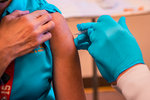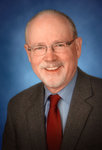

For more than a year, we have adjusted to life with COVID-19, waiting with great anticipation for the arrival of vaccines.
And now, with vaccines here and all Washingtonians 16 years or older eligible to receive them, we have a curious dilemma on our hands: many people are still wondering whether or not to get vaccinated.
In the spirit of full disclosure, I chose to be fully vaccinated. As a medical professional, I believe the COVID-19 vaccines were developed responsibly, based on decades of scientific study and represent our best defense against the dangers of the virus. The vaccines all but eliminate the risk of transmitting the virus, and that, to me, is one of the strongest arguments in favor of vaccination.
What we’re really talking about here is reducing risk: risk of contracting the virus and risk of giving it to someone else — a friend, family member or neighbor. Even a complete stranger. We’re also talking about contributing to something bigger than ourselves individually — the greater good of our community.
Currently, more than half of all U.S. adults have received at least one COVID-19 vaccine dose — about 130 million people according to the Centers for Disease Control and Prevention. Another 84 million — one-third of adults in the US — are now fully vaccinated.
The vaccine has dramatically reduced the risk of contracting, hospitalization and death from this horrible disease. Some research shows the vaccine reduces symptoms for COVID-19 patients. This is an important factor for those who may be on the fence about whether they should get the shot.
Just as gloves, masks and gowns protect us on the outside, vaccines protect us from the inside. In providing an added layer of protection against viruses and infection, they’re really just another preventative measure added to a long list of other safety steps we take each day — much like wearing a seat belt. These simple, low-risk investments in our health and safety can result in significant, long-term health benefits.
When I had conversations with patients about possible treatment options, I always did my best to walk them through the pros and cons of each particular course of treatment, helping them understand the risks and benefits. The same approach should apply to the COVID-19 virus, and the risk it poses to us individually, and to our families, friends and community.
We will never eliminate all risk with COVID-19, but that doesn’t mean we should ignore the vaccine. Car accidents remain a credible threat — about 100 Americans die each day in car crashes, and yet we still drive and ride in them. And a lot fewer people die in auto accidents because of seatbelt usage.
New federal data indicates that either zero or one vaccinated person will die each day from COVID. That’s a small, small fraction of the unvaccinated who are dying from the disease. Again: what are the risks, and what are the rewards?
Admittedly, there will always be people who, for medical or religious reasons, are unable to receive the COVID-19 vaccine.
To those who remain unvaccinated and still have concerns, I encourage you to contact your health care provider — a physician, dentist, or optometrist — to find answers to your questions. Putting the vaccine off without addressing those questions only prolongs the decision — and increases your risk for contracting COVID-19 virus.
To those who want to get vaccinated, you’re in luck. More appointment slots are opening all the time at pharmacies, health department clinics and other local vaccination events.
Shots can increasingly be found without too much effort through the Washington State Department of Health website at https://vaccinelocator.doh.wa.gov/.
We’ve all seen too much illness, loss and grief this past year. And we’re all eager to resume life as we once knew it.
Let’s do what we can to restore hope and move forward: roll up our sleeves and get vaccinated.
•••
Dr. David Stanfield is assistant director of optometry at Pacific Cataract and Laser Institute in Chehalis and is president-elect of the Optometric Physicians of Washington.